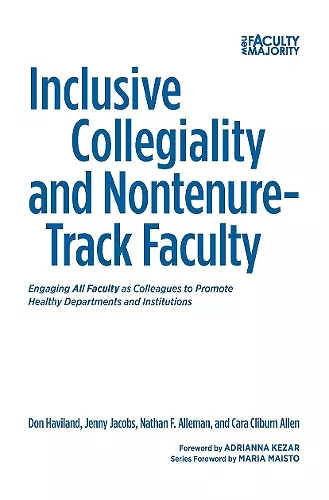Inclusive Collegiality and Nontenure-Track Faculty
Engaging All Faculty as Colleagues to Promote Healthy Departments and Institutions
Jenny Jacobs author Nathan F Alleman author Don Haviland author Cara Cliburn Allen author
Format:Hardback
Publisher:Taylor & Francis Inc
Published:13th Mar '20
Currently unavailable, and unfortunately no date known when it will be back
This hardback is available in another edition too:
- Paperback£28.99(9781620366455)

This book focuses on the status and work of full-time non-tenure-track faculty (NTTF) whose ranks are increasing as tenure track faculty (TTF) make up a smaller percentage of the professoriate. NTTF experience highly uneven and conditional access to collegiality, are often excluded from decision-making spaces, and receive limited respect from their TTF colleagues because of outdated notions that link perceived expertise almost exclusively to scholarship. The result is often a sub-class of faculty marginalized in their departments, which reduces the inclusion of diverse voices in academic governance, professional relationships, and student learning. Given these implications, the authors ask, how can departments, institutions, and the profession do more to engage NTTF as full and active colleagues? The limited access of NTTF to the rights and responsibilities of collegiality harms institutional success in several ways. Given the full-time nature of their work and the heavy (but not exclusive) focus on instruction, NTTF are likely to be on campus as much or more than TTF, and thus be engaged with students, colleagues, and administrators in ways that more closely resemble TTF than part-time faculty. Their limited access to collegial spaces makes it harder for them to do their jobs by restricting access to information and input into decision-making. Moreover, since the greatest growth among women faculty and faculty of color is in NTTF roles, their exclusion from collegiality and decision-making negates the very diversity the profession claims to seek. Finally, colleges and universities face financial, curricular, and organizational challenges which require broad input, although the burden of governance is falling on fewer shoulders as the percentage of TTF declines and NTTF are excluded from these spaces.Ultimately, NTTF must be engaged as partners and colleagues in supporting institutional health. This book – the fruit of extensive data collection at two institutions over a five-year period – describes lessons learned from and benefits experienced by departments that have successfully supported and engaged NTTF as colleagues. Drawing on their research data and analysis of “healthy” departments that integrate NTTF, the authors identify the practices, policies, and approaches that support NTTF inclusion, shape a more positive workplace environment, improve morale, satisfaction, and commitment, and fully leverage the expertise of NTTF and the valuable human capital they represent. The authors argue that this...
From the Foreword:
"This book could not come at a better time. Campuses are recognizing the need to support the growing non-tenure track faculty (NNTF) and to include them in the life of the campus. The notion of collegiality as it relates to NTTF has been rarely considered and certainly not explored in any detail as is done in this valuable text. Collegiality is central to a healthy work environment and particularly significant for professionals whose work is interdependent. The book offers valuable insights into understanding the many ways collegiality is important and provides a helpful definition of this sometimes-elusive concept, often spoken about, commonly misunderstood."
“Given the increased population of Non-Tenure Track Faculty serving at colleges and universities, it is vital that these important members within the academic community are respected, supported, and fully integrated into our departments and institutions. This provocative text is informed by rigorous research which provides clear strategies to create healthy academic environments. Inclusive Collegiality and Non-Tenure Track Faculty is a seminal and compelling resource for scholars and academic leaders seeking to advance these efforts.”
Sydney Freeman, Jr., Associate Professor of Higher Education Leadership and Qualitative Research; Senior Editor-in-Chief, Journal for the Study of Postsecondary and Tertiary Education (JSPTE)
University of Idaho
"Inclusive Collegiality and Non-Tenure Track Faculty is a call to action. Seemingly small acts of kindness and respect contribute to collegial departments, with relationship building central to this work. The authors provide ready-to-implement strategies to recognize the expertise and value that non-tenure track faculty bring to the academy, and highlight the linchpin role of department chairs. Building inclusive collegiality takes work, and this book helps provide a roadmap to reach this goal."
Pamela L. Eddy, Professor, Higher Education, and Department Chair of Educational Policy, Planning & Leadership
College of William and Mary
“A valuable text for academic leaders and faculty which centers the experiences of non-tenure track faculty and is a clarion call for inclusive collegiality. The authors interrogate normative, exclusive notions of collegiality and introduce readers to departments that model cultures that respect, value, and engage non-tenure track faculty as experts. They provide seemingly simple recommendations and tools that, if implemented, can nurture an essential inclusive collegium—their simplicity gives us hope that cultural change is possible, and necessary.”
Jeni Hart, Dean and Vice Provost for Graduate Studies
University of Missouri
“As our government, and particularly our educational systems, explore ways to be more inclusive in our teaching and increase diversity in our ranks, this book explores many aspects of collegiality in higher education. It defines a collegial work environment, what policies and practices create a less-than-inclusive and collegial atmosphere for non-tenure track faculty in our institutions of higher education. Several earlier studies have identified a sense of dissatisfaction among non-tenure-track faculty in interactions with colleagues and a lack of integration and voice in curricular matters in a department, thus leading to a less than optimal collegial working environment.
Haviland and colleagues have provided a much-needed discussion for nontenure-track faculty that readers can extend to their individual circumstances during this unusual time.”
Journal of Faculty Development
ISBN: 9781620366448
Dimensions: unknown
Weight: 322g
125 pages